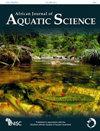屠宰场活动对尼日利亚阿萨巴 Anwai 河水质和周围土壤的影响
IF 1
4区 环境科学与生态学
Q3 MARINE & FRESHWATER BIOLOGY
引用次数: 0
摘要
安韦河是尼日利亚阿萨巴最重要的河流,因为它有许多用途,其中包括屠宰活动。本研究旨在评估 2020 年雨季和旱季期间安韦河地表水和周围土壤受屠宰场活动影响的情况。土壤和水样本的质量采用美国公共卫生协会制定的标准程序进行分析。水质分析结果显示,pH 值、溶解固体总量和悬浮固体总量分别为 6.45 至 6.67、13.50 毫克/升至 24.42 毫克/升、2.19 ± 0.04 毫克/升至 10.79 毫克/升。土壤 pH 值、总有机物含量、钯和铬的 pH 值范围分别为 5.83 至 7.65 个 pH 单位、0.15 至 2.74%、1.88 ± 0.03 至 22.8 ± 0.28 mg kg-1 和 0.86 ± 0.03 至 4.87 ± 0.04 mg kg-1。上游、中游(屠宰场旁)和下游样本之间存在明显差异;但是,大部分参数在旱季和雨季的结果没有明显差异。旱季和雨季的中游水质指数值分别为 104.89 和 119.34,这表明中游水样的水质较差。研究结果表明,屠宰场活动对河水和土壤质量造成了负面影响。本文章由计算机程序翻译,如有差异,请以英文原文为准。
Effect of abattoir activities on the quality of water and surrounding soil of the Anwai River in Asaba, Nigeria
The Anwai River is the most important river in Asaba, Nigeria, because of its many uses, and these include abattoir activities. The aim of this study was to assess the surface water and surrounding soil of the Anwai River for the effects of abattoir activities during the wet and dry seasons of 2020. The quality of soil and water samples was analysed using standard procedures as set by the American Public Health Association. Results of water analyses showed that pH, total dissolved solids and total suspended solids varied from 6.45 to 6.67, 13.50 mg L−1 to 24.42 mg L−1, and 2.19 ± 0.04 mg L−1 to 10.79 mg L−1, respectively. Soil pH, total organic content, Pd and Cr had a range of 5.83 to 7.65 pH units, 0.15 to 2.74%, 1.88 ± 0.03 to 22.8 ± 0.28 mg kg−1, and 0.86 ± 0.03 to 4.87 ± 0.04 mg kg−1, respectively. There were significant differences between Upstream, Midstream (by the abattoir) and Downstream samples; however, there were no significant differences between dry and wet season results for most of the parameters. Midstream values for the water quality index were 104.89 and 119.34 in the dry and wet seasons, respectively, which showed that the Midstream water samples were poor. The findings of this study showed that the abattoir activities were negatively impacting river water and soil quality.
求助全文
通过发布文献求助,成功后即可免费获取论文全文。
去求助
来源期刊

African Journal of Aquatic Science
MARINE & FRESHWATER BIOLOGY-
CiteScore
3.90
自引率
7.10%
发文量
31
审稿时长
>12 weeks
期刊介绍:
The African Journal of Aquatic Science is an international journal devoted to the study of the aquatic sciences, covering all African inland and estuarine waters. The Journal publishes peer-reviewed original scientific papers and short articles in all the aquatic science fields including limnology, hydrobiology, ecology, conservation, biomonitoring, management, water quality, ecotoxicology, biological interactions, physical properties and human impacts on African aquatic systems.
 求助内容:
求助内容: 应助结果提醒方式:
应助结果提醒方式:


